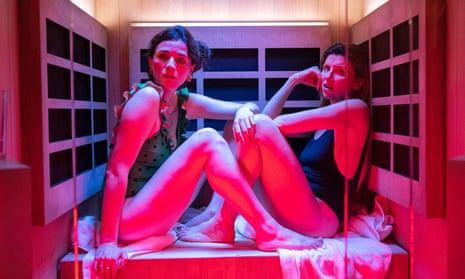We first met Aisling Bea’s Aine two years ago, as she was being signed out of the rehab facility, where she had been staying after “a teeny little nervous breakdown” – later revealed to have included a suicide attempt. We watched, alternately heart-in-mouth or laughing convulsively, as a job teaching English to foreign language students (“Get those worksheets in by Monday or I will Brexit the lot of you”), a fledgling relationship with Richard (Tobias Menzies) – the emotionally repressed father of Etienne, a private student who had recently lost his mother – and the brutal, unconditional love of her sister Shona (Sharon Horgan) helped to put her back together and find a comfortable enough place in the world again.
This Way Up (Channel 4) was up there with Fleabag as one of the best comedy-dramas of 2019. So funny, so tender, so deftly and seemingly effortlessly scripted (by Bea) and just as deftly and seemingly effortlessly played by everyone that you could watch and rewatch the six half-hour episodes and find something new to marvel at each time.
Now the second series is here and looks likely to repeat the triumph. This time our heroine is in a relatively good place – metaphorically speaking. She and Shona open proceedings in a sauna “like a confession booth”, talking over the possibility of Shona getting a fringe (“Oh my God,” says her concerned sister. “Are you OK? Are you happy?”) and Shona’s move in with fiance Vish (Aasif Mandvi, even though his home is so far away from her little sister’s. “It’s 20 minutes overground,” Shona says. “Twenty minutes!” says Aine. “That’ll take me ages!” Shona holds firm. There are moments, she explains, with elder wisdom, when you have to show in life whether you’re in or whether you’re out. “And I’m out. In!” Aine still does not know about her sister’s affair with her colleague Charlotte (Indira Varma) after she – eventually – accepted Vish’s proposal.
Bea and Horgan’s chemistry is as glorious as ever. They overlap and underlap perfectly, giving expansive but controlled performances that never take from each other. It is wonderful – indeed it feels almost a privilege – to watch, from their bickering moments to being pure idiots together (rolling around on Vish’s underfloor heating while he watches in bemusement – “It’s like you’ve never been warm before”) and all points in between. As they did in the first series, serious moments slide in from nowhere. In the middle of a discussion of the merits of going on Tinder versus sleeping with your boss (the latter is in the offing), a suddenly exasperated Shona says, “Sometimes you talk like you’re the only one who’s ever – sad. It’s annoying.” Is she all right, asks Aine, already on the alert after the fringe chat. “Wha’?” says Shona, scrambling away from the deep emotional waters at full Irish Catholic speed (we can’t swim). “I’m fine! Shut up!”
Once Etienne has headed off to France, Richard and Aine look forward to their first proper date. “I’m cooking. So. Get excited.” Things are going well at work – there are even plans to set up an online school, with Aine as a founding member – and happiness seems to beckon.
Alas, what goes up must come down and, well, it’s Richard’s member. The first time doesn’t work (for him – and, despite Aine’s polite protestations, he goes on to make it work for her. “No, no, honestly you don’t have to – just feel a bit guilty because – yes – Jesus Christ, fucking hell …!”) nor the second (“Next time!” she says. “Yes we can!”) and it’s all so funny and humane and clever and such a perfect showcase for Bea’s gift for writing and playing allusive half-sentences around moments of potential devastation and hilarity that you almost hope he doesn’t manage it next time either.
The best thing of all about This Way Up is that we don’t know what is going to happen next. Bea’s is such a nuanced, delicate portrait of mental health that Aine is neither a one-note self-sabotager, or manic, or depressive (nor is she any of the other comedy or drama female staples, such as the ditsy damsel or flinty bitch with a heart of gold and/or secret sorrow). She is a real person and, as such, she could go anywhere or do anything depending on when and if her circumstances change. She will react within credible parameters, but you won’t know quite how until she does, any more than you do with anyone you have ever met in real life. The same is true of Shona and Richard, Charlotte and the rest of them. Isn’t that incredible? Isn’t that just, isn’t that almost indistinguishable from, magic?

Comments (…)
Sign in or create your Guardian account to join the discussion